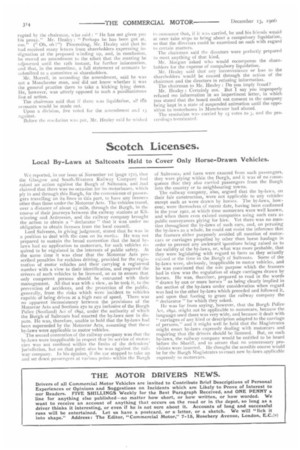Scotch Licenses.
Page 8

If you've noticed an error in this article please click here to report it so we can fix it.
Local By-Laws at Saltcoats Held to Cover Only Horse-Drawn Vehicles.
We reported, in our issue of November 1 st (page 172., that the Glasgow and South-Western Railway Company had raised an action against the Burgh of Saltcoats, and ,had claimed that there was no occasion for its motorbuses, which ply in and through this Burgh, for the convenience of passengers travelling on its lines to this part, to have any licences other than those under the Motorcar Acts. The vehicles travel, over a distance of about m. mile, through the Burgh, in the course of their journeys between the railway stations at Kuwinning and Ardrossan, and the railway company brought the action to obtain a " declarator " that it was under no obligation to obtain licenses from the local council.
Lord Salvesen, in giving judgment, stated that he was ill a position to deal with the case on its merits. He was not prepared to sustain the broad contention that the local bylaws had no application to motorcars, for such vehicles required to be regulated in the interests of public safety. At the same time it was clear that the Motorcar Acts prescribed penalties for reckless driving, provided for the registration of motor vehicles and their carrying a registered number with a view to their identification, and required the drivers of such vehicles to be licensed, so as to ensure that only competent persons should be entrusted with their management. All that was with a view, as he took it, to the prevention of accidents, and the protection of the public, generally, from the risks which were incident to vehicles capable of being driven at a high rate of speed. There was no apparent inconsistency between the provisions of the Motorcar Acts and Sections 270 to 272 inclusive of the Burgh Police (Scotland) Act of 1892, under the authority of which the Burgh of Saltcoats had enacted the by-laws now in dispute. He was, therefore, unable to hold that the by-laws had been superseded by the Motorcar Acts, assuming that these by-laws were applicable to motor vehicles.
The second contention of the railway company was that the by-laws were inapplicable in respect that its service of motorcars was not confined within the limits of the defenders' jurisdiction, but on that point also he was against the railway company. In his Opinion, if the car stopped to take up and set down passengers at various points within the Burgh of Saltcoats, and fares were exacted from such passengers, they were plying within the Burgh, and it was of no consequence that they also carried passengers from the Burgh into the country or to neighbouring towns. The railway company, also, argued that the by-laws, on their fair construction, were not applicable to any vehicles except such as were drawn by horses. The by-laws, however, were themselves of recent date, having been confirmed in the year 1902, at which time motorcars were well known, and when there even existed companies using such cars as public conveyances plying for hire. Yet there was no mention throughout the by-laws of such cars, and, on perusing the by-laws as a whole, he could not resist the inference that the framers either purposely avoided all mention of motorcars or carriages propelled by other than horse haulage in order to prevent any awkward !questions being raised as to the validity of the by-laws, or, what was more probable, that they were legislating with regard to facts as they actually existed at the time in the Burgh of Saltcoats. Some of the by-laws were, obviously, inapplicable to motor vehicles, and he was convinced that the sole purpose which the framers had in view was the regulation of stage carriages drawn by horses. He was, therefore, prepared to read in the words " drawn by one or more horses " as being clearly implied in the section of the by-laws under consideration when regard was had to the other by-laws which preceded and followed it, and upon that footing to grant the railway company the " declarator " for which they asked. He was far from saying, however, that the Burgh Police Avr, 1892, might not be applicable to motorcars, because the language used there was very wide, and because it dealt with " carriages of any kind or description adapted to the carriage of persons," and it might well be held that the Magistrates might enact by-laws expressly dealing with motorcars and requiring that tile drivers should be licensed. But, on such by-laws, the railway company would be entitled to be heard before the Sheriff, and to secure that no unnecessary provisions were inserted. He thought the sensible course would be for the Burgh Magistrates to enact new bv-laws applicable expressly to motorcars.


























